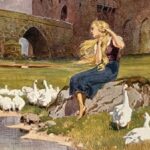Once upon a time, two poor woodcutters were making their way home through a vast pine forest. It was winter, and the night was cold.
Snow lay thick on the ground and on the branches, and the frost crackled underfoot as they passed: and when they reached the Mountain Falls, they saw that the water was frozen still in mid-air, for King Frost had kissed it. The cold was so bitter that even the birds did not know what to do.
“Brrr!” grumbled the Wolf, wrapping his tail around his legs as he padded through the bushes. “Why doesn’t the government do something about this?”
“Tweet! Tweet! Tweet!” replied the Blue Tit.
“Old Mother Earth is dead and gone,” said the birds. “She has been laid to rest in her white shroud.”
“She is getting married,” they whispered to each other. “This is her wedding dress.”
“Nonsense!” growled the Wolf, whose outlook was always practical. “It’s the government’s fault, I tell you. And if you don’t believe me, I’ll eat you all up, so there!”
The Wolf was never at a loss for a good argument.
“Oh, do be quiet,” said the Woodpecker, who was a born philosopher. “As far as I’m concerned, I don’t need any new theories to explain things. The fact is, it’s perishingly cold.”
It certainly was perishingly cold. The little squirrels who lived in the tall fir tree were rubbing noses to keep warm; the hares were curled up in their burrows, not daring to stick so much as a whisker outside. The only creature who seemed to be enjoying himself was the great horned owl.
His feathers were stiff with frost, but he didn’t care; he blinked his yellow eyes and called to his friends across the forest: “Tu-whit! Tu-whoo! What glorious weather! Tu-whit! Tu-whoo!”
The two woodcutters hurried on, blowing on their fingers, their huge snow-boots with iron soles leaving deep marks in the snow.

Photo.
Sometimes they would slip into a deep gully, and when they climbed out again their clothes would be white with snow, like a miller’s; sometimes they would slide on the hard ice where the marsh water had frozen, and the logs they were carrying would tumble loose, and they would have to pick them up and bind them again, and sometimes they would think they had lost their way, and be afraid, for they knew how cruel Queen Frost could be to travellers who fell asleep in her arms.
But they put their trust in good St. Matthew, who looks after all who journey by night, and so they plodded on. At last they reached the edge of the forest, and far below them in the valley they saw the lights of their village twinkling.
They were glad to be safe home, and they laughed and joked, and then they saw that the earth was like a silver flower, and the moon like a golden flower. But after they had laughed and joked, they became sad, thinking of their poverty. One said to the other:
“How can we laugh and joke? Life is for the rich, not for such poor fellows as we. We would have been better off if we had frozen to death in the forest, or been eaten by a wild beast.”
“True,” replied his friend.
“Then,” said the first woodcutter, “let us go and look for the gold which falls from heaven.”
So they hurried off to search for the treasure, and one of them, who was quicker than the other, outstripped his friend and rushed through the bushes. “Ah!” he cried. “Here is a golden treasure fallen from heaven!”
He stooped to pick it up, and it was a richly embroidered coat covered with stars, and rolled up inside it was a baby boy.
The woodcutter hurried back to his friend and showed him the treasure they had found. They sat down in the snow and unrolled the coat, expecting to find gold and silver, but alas! there was nothing but a baby.
“This is the end of our hopes,” said one. “What good is a baby to poor men like us? Let’s leave it here and go on our way. We have children of our own to feed, and we can’t share their crust with another.”
But his friend said:
“No, that would be a wicked thing to do. I am as poor as you, and my family is large, and I have nothing to put in the pot, but I will take the baby home and my wife will nurse it.”
So he wrapped the baby warmly in the embroidered coat and carried him down the hill to the village, while his friend marvelled at his folly and his kindness. When he reached his cottage, his wife came to the door, and putting her arms round his neck, she kissed him and took the bundle of wood from his back and brushed the snow from his boots.
He said to her:
“Here is something I found in the forest. It is for you to look after.”
And he would not go inside until she had seen what he had brought. Then she cried:
“Alas! We have children enough of our own. Why must you bring another to the house? What ill-luck will this bring upon us?”
She scolded her husband, and he made no reply, but stood in the doorway, and at last she turned and saw the baby in his arms.
“Oh, heavens!” she cried. “Have we not children enough? Must you bring this one to the house as well? What harm have we done that this ill-luck should come upon us?”
“You speak like that,” said her husband, “but it is not right. The good St. Matthew has cared for us on our journey, and shall we not care for this little one?”
The wife was still angry, and she grumbled and scolded, and at last she turned and looked at the baby, and her tears fell on him. The woodcutter took him and laid him in the little bed where their youngest child was sleeping.
And every year the baby grew more beautiful, and all the villagers marvelled, for while they were swarthy and dark-haired, he was as white as ivory and his hair curled in golden rings like the petals of a water-lily.
His lips, too, were like the petals of a red flower, and his eyes were like the blue flowers that grow by the clear streams, and his body was like a white lily in an untrodden meadow. But because he was so beautiful, he became proud and cruel and selfish.
He despised the woodcutters’ children, for he thought himself of noble birth, being descended from a star, and he made himself their leader, and they did whatever he told them. If he bade them tease a lame child or an old man who was blind or crippled with pain, they would do it, and they would laugh and run away when the poor creatures wept.
Indeed, he was so beautiful that he could not bear the sight of anything ugly or maimed, and he would stone them out of the village, so that except for thieves, no beggars came near the place. He was merciless to those who were ill or misshapen, and he would mock them, for he loved only himself, and in the summer, when the wind was still, he would lie by the well in the orchard and look down at his own face in the water, and smile to see how beautiful he was.
The woodcutter and his wife would scold him, saying: “We do not treat you as you treat those who are in trouble. Why are you so cruel?” And the old priest would send for him and try to teach him to love all God’s creatures. “The fly is your brother,” he would say. “Do not hurt him! The birds of the air have their freedom. Do not snare them for your sport. God made the crystal snake and the mole, and each has its place. Who are you to bring sorrow into God’s world? Even the cattle in the fields praise Him.”
But the Star Boy would frown and turn away, and he would not listen, and he would go back to his friends and lead them, for they did whatever he told them. If he took a sharp stick and blinded the eyes of a mole, they would laugh, and if he stoned a slow worm they would laugh too. Whatever he did, they did also, and their hearts were as hard as his.
Now one day a poor beggar woman came through the village. Her clothes were torn and her feet were bleeding from the rough road, and her plight was pitiful. But the Star Boy saw her, and he said to his friends:
“Look! There is a silly old beggar woman sitting under the beautiful green tree. Let us go and drive her away, for she is ugly and we don’t want her.”
So he went towards her, throwing stones, and mocking her, and when the woodcutter saw what he was doing, he ran to stop him and scolded him, saying:
“Your heart is hard, indeed. What harm has this poor woman done to you that you should treat her so?”
Then the Star Boy grew angry, and he stamped his foot and said:
“What is that to you? I am not your son, so you cannot tell me what to do. I will do as I please.”
“That is true,” replied the woodcutter.
“I found you in the forest, and you have been hard and cruel ever since.”
As he spoke, the beggar woman cried out and fainted away. The woodcutter carried her into his house, and his wife tended her. When she recovered, they set food and drink before her, and tried to comfort her. But she would not eat, and she said to the woodcutter:
“Did you say you found him in the forest? How long ago was that? Was he wrapped in a rich coat embroidered with stars, and did he wear a necklace of amber?”
“Yes,” replied the woodcutter. “He has been with us three years.”
“Show me the coat and the necklace,” said the beggar woman.
So the woodcutter opened the chest and showed her the coat and the necklace of amber, and she wept for joy and said:
“He is my son, whom I lost in the forest. I have sought him through the world these three years. Show him to me, I pray you.”
The woodcutter and his wife went to fetch the Star Boy, and they said to him:
“Your mother is here. Come and greet her.”
And he ran in, full of wonder and great joy. But when he saw the beggar woman waiting for him, he laughed and said:
“My mother, indeed! Get away, you silly old beggar woman. I am not your son. You are ugly and ragged and dirty, and I will not have you for my mother.”
“Oh, my son, my little son,” she cried, “I am your mother, whom you have lost in the forest. These are the tokens, the rich coat and the necklace of amber. Come to me, my son.”
She knelt and held out her arms to him, but he would not go to her. His heart was closed, and he heard nothing but her cries, and at last he said:
“If you are my mother, it is a shame to me, for I thought I was the child of a star, and not of a beggar woman. Go away, and let me not see your ugly face again.”
“Oh, my son, my little son,” she wept, “will you not kiss me before I go? I have sought you through the world, and my heart is sore for you.”
“No!” said the Star Boy. “I cannot bear to look at you, you are so ugly. I would rather kiss a toad or a snake. Go away and leave me.”
So the beggar woman rose and went away down the road, weeping bitterly, and the Star Boy watched her go, and his heart was glad. But the little sister of the woodcutter came to him and put her hand on his shoulder and said:
“Brother, you are no longer beautiful, but never mind. Stay with us, and I will not laugh at you.”
“No,” said the Star Boy, “I have been cruel to my mother, and I must be punished. I must go through the world and seek her, and when she has forgiven me, I will come back.”
So he left the village and went into the forest, calling for his mother, but no one answered. All day he sought her, and when the sun set, he lay down on a bed of leaves and wept, for the birds and the beasts shunned him, remembering his cruelty.
Only the toad looked at him, and the slow worm crawled slowly by. On the second day he sought her through the forest, asking all he met if they had seen her, and the Mole, whose eyes he had blinded, said:
“How can I see anything, now that you have put out my eyes?”
And the Blue Tit, whose wings he had clipped, said:
“How can I fly about the forest, now that you have cut my wings?”
And the little Squirrel, whose mother he had killed, said:
“You killed my mother. Do you think I will tell you where yours is?”
On the third day he sought her through the forest, and in the evening, when he was very tired, he sat down and wept, and the little Rabbit, whose leg he had broken in a trap, hobbled up to him and said:
“You set me free. How can I help you?”
“I am seeking a white gold coin which is hidden here,” said the Star Boy, “and if I do not find it, I shall be beaten and kept as a slave. Help me, I pray you.”
“Follow me,” said the Rabbit, and he led the Star Boy to a cleft in an oak tree, and there was the white gold coin.
“How can I thank you?” said the Star Boy.
“You helped me first,” said the Rabbit, and he ran away.
The Star Boy picked up the coin and hurried back to the village, but the leper, who was sitting by the roadside, called to him and said:
“Give me a gold coin or I shall die.”
“I have only one,” said the Star Boy, “and if I do not take it home my master will beat me and keep me as his slave.”
But the leper begged and prayed until the Star Boy was sorry for him, and gave him the coin. When he reached the wizard’s house, the wizard opened the door and led him in and asked:
“Have you brought the white gold coin?”
“No,” said the Star Boy.
So the wizard beat him and gave him a dry crust and a cup of salt water, and thrust him into the dark cellar. Next morning he came to him and said:
“If you do not bring me the yellow gold coin today, I will keep you as my slave and beat you with three hundred stripes.”
So the Star Boy went into the forest, and he sought the yellow gold coin all day, but he could not find it, and when the sun set he sat down and wept. Then the little Rabbit, whose leg he had broken, came to him and said:
“Why do you weep?”
“I am seeking a yellow gold coin which is hidden here,” said the Star Boy, “and if I do not find it, I shall be beaten and kept as a slave.”
“Follow me,” said the Rabbit, and he led him to a pool, and there at the bottom was the yellow gold coin.
“How can I thank you?” said the Star Boy.
“You helped me first,” said the Rabbit, and he ran away.
The Star Boy picked up the coin and hurried back to the village, but the leper, who was sitting by the roadside, called to him and said:
“Give me a gold coin or I shall die.”
“I have only one,” said the Star Boy, “and if I do not take it home my master will beat me and keep me as his slave.”
But the leper begged and prayed until the Star Boy was sorry for him, and gave him the coin. When he reached the wizard’s house, the wizard opened the door and led him in and asked:
“Have you brought the yellow gold coin?”
“No,” said the Star Boy.
So the wizard beat him and gave him a dry crust and a cup of salt water, and thrust him into the dark cellar. Next morning he came to him and said:
“If you do not bring me the red gold coin today, I will kill you.”
So the Star Boy went into the forest, and he sought the red gold coin all day, but he could not find it, and when the sun set he sat down and wept. Then the little Rabbit, whose leg he had broken, came to him and said:
“Why do you weep?”
“I am seeking a red gold coin which is hidden here,” said the Star Boy, “and if I do not find it, I shall be killed.”
“Follow me,” said the Rabbit, and he led him to a cave, and there at the far end was the red gold coin.
“How can I thank you?” said the Star Boy.
“You helped me first,” said the Rabbit, and he ran away.
The Star Boy picked up the coin and hurried back to the village, but the leper, who was sitting by the roadside, called to him and said:
“Give me a gold coin or I shall die.”
“I have only one,” said the Star Boy, “and if I do not take it home my master will kill me.”
But the leper begged and prayed until the Star Boy was sorry for him, and gave him the coin. When he reached the wizard’s house, the wizard opened the door and led him in, and the Star Boy
The Willow’s Tale
Knút’s story is a tale of enduring love for his childhood sweetheart. It’s a narrative that tugs at the heartstrings, a testament to the power of young affection that blossoms into something deeper and more meaningful over time. This is a story of devotion, of a love that transcends the trials and tribulations of growing up and stands as a shining example of true romance.



































